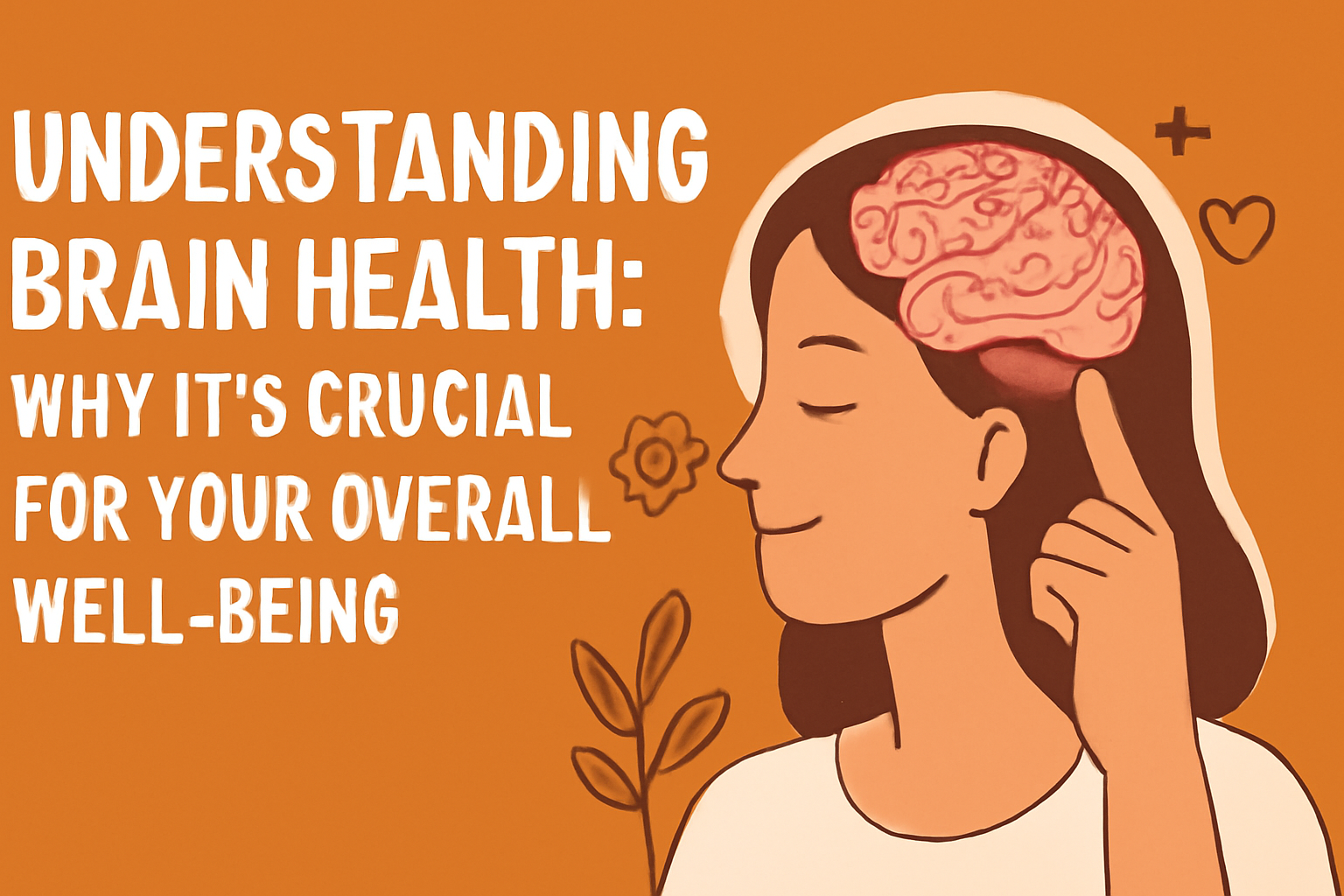Understanding Brain Health: Why It’s Crucial for Your Overall Well-Being

Our brain is arguably the most important organ in the human body. It governs nearly every aspect of our lives—from our thoughts and emotions to our actions and decisions. Brain health isn’t just about avoiding neurological diseases; it’s about nurturing and supporting a powerful organ that plays a central role in how we function daily. When we prioritize brain health, we unlock the potential for a longer, healthier, and more fulfilling life.
The Role of the Brain in Your Well-Being
The brain is often referred to as the command center of the body. It controls everything we do, from breathing to thinking and moving. Beyond just the physical actions, our brain processes emotions, forms memories, and enables us to solve problems and make decisions. For this reason, brain health isn’t only crucial for cognitive function; it directly influences our mood, mental health, and overall quality of life. A well-maintained brain supports emotional regulation, reduces stress, and helps us feel more energetic and present in our daily activities. On the flip side, poor brain health can lead to difficulties such as forgetfulness, poor decision-making, and even mental health issues.
Why Brain Health Matters for Everyone
When most people think of brain health, they tend to focus on avoiding diseases like Alzheimer’s, Parkinson’s, or dementia. While preventing these conditions is a valid reason to prioritize brain health, it’s only one aspect of the bigger picture. Taking care of our brains can lead to improved cognitive function, emotional stability, and better overall well-being. Brain Health is about more than just preventing disease—it’s about optimizing how we think, feel, and function day to day.
Our brains are constantly working, even when we’re at rest. It’s the organ responsible for memory retention, problem-solving, critical thinking, and creativity. Without a healthy brain, we may experience challenges in retaining information, processing emotions, or adapting to changes in our environment. Moreover, brain health plays an important role in physical health. Research suggests that a healthy brain is linked to lower risks of cardiovascular diseases, better sleep, and enhanced immune function. Essentially, a well-maintained brain contributes to a higher overall quality of life.
Tips to Support and Enhance Your Brain Health
Taking care of your brain is easier than you might think. By incorporating a few simple yet effective strategies into your daily routine, you can give your brain the support it needs to function optimally.
1. Stay Mentally Active
Much like how physical exercise strengthens muscles, mental exercise strengthens the brain. Engaging in activities that challenge your cognitive abilities, such as puzzles, reading, learning new skills, or even playing a musical instrument, helps build and maintain cognitive functions. These activities keep your brain cells engaged and promote neuroplasticity, the brain’s ability to adapt and form new neural connections throughout your life.
2. Prioritize Sleep
Sleep plays a critical role in brain health. During sleep, the brain processes and consolidates information, clearing out toxins that accumulate during waking hours. A lack of sleep can impair cognitive function, cause memory lapses, and even increase the risk of mental health disorders. Adults should aim for 7-9 hours of quality sleep each night to ensure their brains get the rest they need.
3. Engage in Physical Activity
Physical exercise isn’t just good for the body; it’s great for the brain too. Regular physical activity increases blood flow to the brain, promotes the growth of new neurons, and can even help to protect against cognitive decline as we age. Activities like walking, swimming, cycling, and yoga have all been shown to improve brain health and boost mood.
4. Nourish Your Brain with Healthy Foods
What you eat plays a significant role in the health of your brain. A balanced diet rich in vitamins, minerals, healthy fats, and antioxidants provides the essential nutrients that support brain function. Foods such as leafy greens, fatty fish, berries, nuts, and whole grains are particularly beneficial for brain health. The Mediterranean diet, which is rich in fruits, vegetables, olive oil, and lean proteins, has been associated with a reduced risk of cognitive decline.
5. Manage Stress
Chronic stress is one of the most damaging factors for brain health. Prolonged stress can interfere with memory, lower cognitive function, and even damage brain cells. To protect your brain, it’s important to manage stress effectively. Practices such as mindfulness, meditation, yoga, and deep-breathing exercises can help reduce stress levels and promote a calm, focused mind.
6. Stay Socially Active
Social connections are vital for mental and emotional well-being. Engaging in meaningful conversations, spending time with loved ones, and participating in community activities all help keep the brain sharp and engaged. Social interactions stimulate areas of the brain associated with cognitive function and emotional regulation, and they can help ward off feelings of isolation and depression.
7. Challenge Your Memory
One of the best ways to keep your brain healthy is by exercising your memory. Try memorizing lists, phone numbers, or even trying to remember details from books and movies. The more you challenge your memory, the more it strengthens. Additionally, using tools like mnemonic devices and memory techniques can also help improve retention and recall.
8. Protect Your Brain from Injury
Brain injuries, even those that seem minor, can have long-lasting effects on cognitive function. It’s essential to protect your brain from harm by using seatbelts while driving, wearing helmets during sports or activities that pose a risk of head injury, and taking precautions in your environment. Avoiding excessive alcohol consumption and staying away from recreational drugs is also important for maintaining a healthy brain.
9. Stay Positive and Practice Gratitude
Your mindset can influence the health of your brain. Negative emotions, like chronic anger or anxiety, can take a toll on the brain, while positive emotions can have the opposite effect. Practicing gratitude, staying optimistic, and focusing on the good in life can enhance brain health. Studies show that positive emotions can reduce stress and promote better cognitive function over time.
10. Regularly Check Your Brain Health
It’s important to take proactive steps to monitor your brain health. Regular checkups with a healthcare professional can help detect early signs of cognitive decline or neurological issues. Routine mental health evaluations, cognitive testing, and even brain scans (when necessary) can provide valuable insights into the health of your brain. This early detection can allow for timely interventions to slow down or reverse any potential issues.
The Connection Between Mental and Physical Health
The link between mental and physical health is undeniable. Just as maintaining a healthy body can reduce the risk of heart disease, obesity, and diabetes, caring for your brain can protect you against a host of cognitive and mental health challenges. Many mental health conditions, such as depression, anxiety, and stress, can negatively impact brain function. On the other hand, focusing on mental well-being through positive habits like mindfulness, social engagement, and stress management can boost both brain and physical health.
It’s also important to note that conditions like high blood pressure, diabetes, and obesity can increase the risk of cognitive decline. By managing these physical health conditions through regular exercise, a healthy diet, and proper medication, you’re not only improving your physical health but also protecting your brain from future harm.
The Impact of Brain Health on Aging
As we age, the brain undergoes changes that can affect cognitive function. Some degree of memory loss and slower processing speeds are natural parts of aging. However, maintaining brain health as we grow older can help mitigate these changes and keep the brain functioning at its best. Lifestyle choices, such as staying physically and mentally active, eating a balanced diet, and managing stress, can greatly impact how we age cognitively.
Studies have shown that people who maintain an active brain through lifelong learning, problem-solving, and social engagement tend to experience less cognitive decline in their later years. In fact, keeping the brain active has been linked to a reduced risk of conditions like dementia and Alzheimer’s disease. Therefore, by prioritizing brain health, we can not only enhance our quality of life today but also ensure that we age gracefully and healthily.
Conclusion
Taking care of your brain is essential for overall well-being, and it has a profound impact on the way we think, feel, and live. By incorporating habits that support brain health, such as staying mentally active, getting enough sleep, eating a balanced diet, and managing stress, we can protect and even enhance cognitive function. Remember that brain health isn’t just about preventing diseases—it’s about optimizing your mind for a longer, happier, and more fulfilling life. Make brain health a priority today, and the benefits will be felt for years to come.
For more information on how to enhance and protect your brain health, visit https://brainmeld.org.


